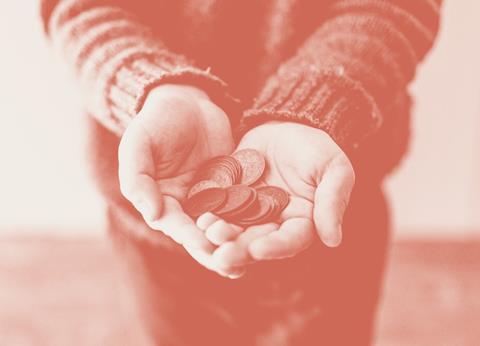Tim Alford reminds us that how we use our resources are a key indicator of what’s in our heart

A few days ago I attended a launch of some new research. One leader present observed that fact that the spiritual practices that were most constantly observed (and those that were least observed) in the lives of young people today correlated directly with those practices that were most present (and most absent) in the lives of their youth leaders.
The lesson? We replicate around us what we cultivate within us.
And that’s where this series on leadership disciplines comes in. We’re exploring spiritual practices and leadership rhythms that help us to flourish, first as disciples of Jesus and, in turn, as leaders in his name. It’s a series that acknowledges this reality; we cannot lead others until we first lead ourselves.
As leaders we seek to map the way for our young people, leading them into life-giving practices that we ourselves have experienced which pave the way to intimacy and abundance in Christ. We set an example because the best gift we have to give our children and young people is a model of the person we are praying they will become.
With that in mind, let’s jump into the next practice in our series: generosity.
‘Money and Happiness: Rank of income, not income, affects life satisfaction’
This was the title of a report that was published following a study conducted at Warwick University. As the title suggests, the research concluded that in order for people to feel happy about how much money they have, it has to be more than what our friends and colleagues have. This turned out to be true no matter how much money we make. As long as one of our peers earns more than us, we aren’t satisfied that we really have enough, no matter how much we may earn.
Such is the cyclical nature of greed. No matter how much money we make, there is always someone with more! (Unless you’re Jeff Bezos of course. If you’re reading this, Jeff, you can ignore that last sentence.)
No where is this better illustrated than with the famous story of the overwhelmingly wealthy oil magnate, John D Rockefeller. Widely considered the wealthiest American of all time, Rockefeller was once asked by a reporter: “How much money is enough?” He responded: “Just a little bit more.”
Indeed. As a wise man once said: “Those who love money never has money enough; those who love wealth are never satisfied with their income’ (Ecclesiastes 5:10).
There is always more.
And that’s where the spiritual practice of generosity comes in. It’s immediately apparent how the spiritual practice of generosity benefits others, but what we often overlook is how powerfully generosity benefits us.
“As long as one of our peers earns more than us, we aren’t satisfied that we really have enough”
Generosity leads to freedom
In choosing to be generous we wield a powerful weapon that strikes to the heart the god of mammon. In giving to others, we free ourselves from the grip of greed. As we loosen our grip on what we have, we find that financial anxiety loosens its grip on us. Freedom from materialism comes as we give it away.
Generosity leads to contentment
In our consumer-driven world, we are conditioned to desire. The advertising industry thrives on selling its vision of the good life: “If I could only have [insert your particular vice of choice here] then I would be content.” Counterculturally, we fail to realise is that, after a point, more money and more stuff usually leads to more strife, not less. Here, then, is the power of generosity: Generosity turns what we have into enough. We learn that we don’t need more to be happy, but that “godliness with contentment is great gain. For we brought nothing into the world, and we can take nothing out of it. But if we have food and clothing, we will be content with that’ (1 Timothy 6:6-8).
Generosity leads to blessing
Furthermore, the repeated promise of scripture is that it is giving, not keeping, that leads to receiving:
“A generous person will prosper; whoever refreshes others will be refreshed” Proverbs 11:25.
“The generous will themselves be blessed, for they share their food with the poor” Proverbs 22:9.
“Remember this: whoever sows sparingly will also reap sparingly, and whoever sows generously will also reap generously” 2 Corinthians 9:6.
Now let’s be clear, this is not a business deal with God. It doesn’t necessarily mean that when we are financially generous the blessing we receive in return will be likewise. This is not a ‘give £10 and God will give you £100’ kind of deal. But scripture is no less emphatic that generosity moves the hand of God to release blessing over our lives in one form or another.
Simply put, we cannot out-give God! As we begin to give we find freedom from scarcity, knowing that God is a God of abundance. He does not lack resource, and he does not hesitate to give good gifts to his children. In fact, God is so emphatic about this that it is the only thing he invites us to test him on (Malachi 3:10)!
With all this in mind then, how do we practise generosity? We see this practice turn up in scripture in a number of ways:

1. Spontaneous generosity
Some of us might have an eye for a good deal, an eye for a bargain, an eye for colour, perhaps an eye for talent or an eye for details. But how about an eye for generosity?
Proverbs 22:9 says: “He who has a generous eye will be blessed, for he gives of his bread to the poor” (NKJV).
Spontaneous generosity, then, is when we see a need and we strive to use what God has entrusted to us to meet that need. It’s when a friend hits challenging times and we order a grocery shop to arrive at their door. It’s when we are moved by a global event and donate to a relief appeal. It’s when we encounter a person sleeping rough on our morning commute and buy them breakfast.
Spontaneous generosity is where we learn to view the world through generous eyes, asking: “Where can what I have meet a need in this situation?”
2. Planned generosity
This is preconceived, planned giving. This is where we intentionally order our finances in such a way that giving is a priority. It’s a ‘generosity budget’, if you will.
The prophet Isaiah has it this way: “Generous people plan to do what is generous, and they stand firm in their generosity” Isaiah 32:8 (NLT).
Giving deliberately means living on less ourselves so that we are able give more. Traditionally, tithing has been the means by which the people of God have practised this type of planned generosity. And while tithing is not (as far as I can tell) commanded under the new covenant, it’s a no-less-helpful practice that I would readily encourage every Jesus-follower to work towards.
As Francis Chan puts it: “The concept of downgrading so that others might upgrade is biblical, beautiful…and nearly unheard of.”
So what would it look like for you to have a ‘generosity budget’: money that you intentionally set aside in order to give?
3. Sacrificial generosity
If you’re reading this, you’re probably a youth or children’s worker, which in turn means you’re likely not awash with spare cash! Alas.
The bad (actually good) news is that biblical generosity requires a great deal more from us than giving whenever the occasion arises that we might have a little spare that we don’t actually need for ourselves.
CS Lewis said it like this: “I’m afraid biblical charity is more than merely giving away that which we could afford to do without anyway.” This is sacrificial generosity.
Sacrificial generosity is that which the apostle Paul described as occurring in the Macedonian churches: “In the midst of a very severe trial, their overflowing joy and their extreme poverty welled up in rich generosity. For I testify that they gave as much as they were able, and even beyond their ability. Entirely on their own they urgently pleaded with us for the privilege of sharing in this service to the Lord’s people” (2 Corinthians 8:2-4).
Sacrificial generosity is that which Jesus commended the poor widow for at the temple treasury: “Jesus sat down opposite the place where the offerings were put and watched the crowd putting their money into the temple treasury. Many rich people threw in large amounts. But a poor widow came and put in two very small copper coins, worth only a fraction of a penny. Calling his disciples to him, Jesus said, ‘Truly I tell you, this poor widow has put more into the treasury than all the others. They all gave out of their wealth; but she, out of her poverty, put in everything – all she had to live on’” (Mark 12:41-44).
With all this said, I understand these are financially challenging times. I know that youth and children’s worker jobs don’t tend to be particularly well paid. And my intent here is most certainly not for anyone who is unable to give to feel any sense of guilt or shame. Far from it. Even so, I do want to encourage each of us to be sure that when we say: “I don’t have enough to give”, we don’t actually mean: “I don’t have enough extra to give without adjusting my lifestyle” or even: “I don’t have enough to give without it costing me something.”
So let’s integrate the practice of generosity in to our discipleship, and model freedom from financial fear for our children and young people. In the words of the master, “Give, and it will be given to you. A good measure, pressed down, shaken together and running over, will be poured into your lap. For with the measure you use, it will be measured to you” (Luke 6:38).
We have launched a video series based on ‘Leadership 101’.

































